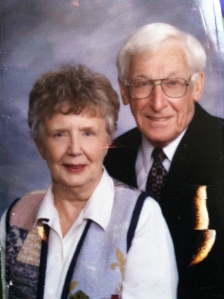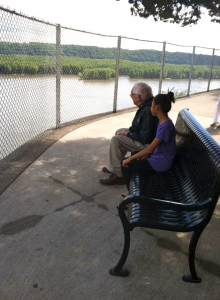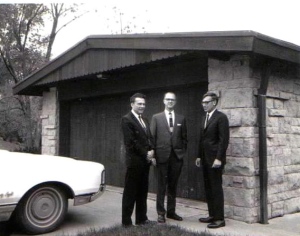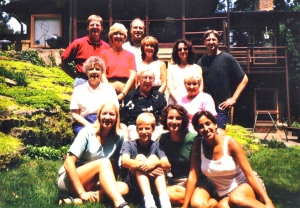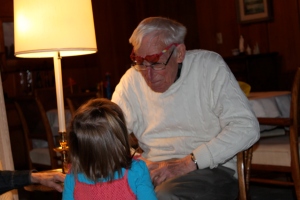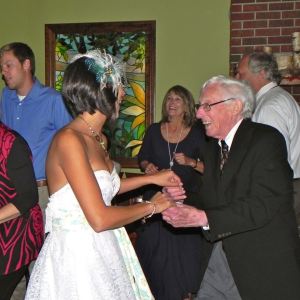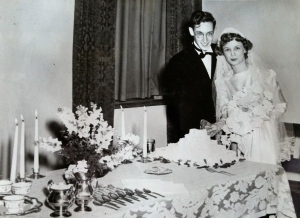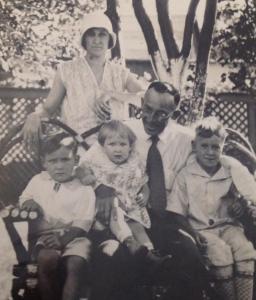
“Now in Joppa there was a disciple whose name was Tabitha, which in Greek is Dorcas. She was devoted to good works and acts of charity. At that time she became ill and died. When they had washed her, they laid her in a room upstairs. Since Lydda was near Joppa, the disciples, who heard that Peter was there, sent two men to him with the request, “Please come to us without delay.” So Peter got up and went with them; and when he arrived, they took him to the room upstairs. All the widows stood beside him, weeping and showing tunics and other clothing that Dorcas had made while she was with them. Peter put all of them outside, and then he knelt down and prayed. He turned to the body and said, “Tabitha, get up.” Then she opened her eyes, and seeing Peter, she sat up. He gave her his hand and helped her up. Then calling the saints and widows, he showed her to be alive. This became known throughout Joppa, and many believed in the Lord. Meanwhile he stayed in Joppa for some time with a certain Simon, a tanner.” – Acts 9:36-43
*****
This past week, my facebook, instagram, and twitter feeds have been filled with posts and articles lamenting the sudden death of Rachel Held Evans, a progressive 37 year old Christian author and blogger. And it’s no wonder: Rachel has made an incredible impact on millions of people, particularly many who are vulnerable and who have been disheartened, hurt, or rejected by the church.
As two other Christian authors and speakers – Sarah Bessey and Jeff Chu – wrote in the Washington Post: “Rachel was ‘for’ an all-embracing vision of Christ’s church and the relentless inclusion of refugees and those suffering poverty, of LGBTQ people, of women and especially women of color, of the unseen and unheard and swept aside… She used her writing to build the bridges so many of us needed to get back to God’s love, to one another, and to the church.”
As I was watching this large community grieve on social media this past week, I was reminded of Tabitha in this morning’s passage in Acts and how she – too – must have made such an impact on her community.
You see, Tabitha had a special ministry for a group of widows, who were in dire need of a provider, a place to belong, and somewhere to have a voice. Because a woman at this time had no inheritance rights and was defined by the social status of first her father, and then her husband, when she lost her husband or her connection with her father or brothers, she also lost her identity, her possessions, her property, and her place of belonging. Widows were considered outcasts in society and were often taken advantage of and were exposed to abuse and oppression.
Because of this, widows usually had to rely on public charity to provide for them in order to survive. And, yet, they did not always find such a provider of charity in the early church. Just a few chapters before our passage for today in Acts we see that the Greek-speaking widows were being neglected of the daily distribution of food. This was such an issue in the early church that it led to the twelve apostles appointing a committee to make sure all the widows were cared for.
In our text for today, we see that Tabitha – the only woman in the entire Bible who was called a disciple – was a sort of provider for her community of widows. We don’t know where she got the financial means to support them. We just know that somehow she acquired some wealth. And she used it – along with her artistic and creative abilities – to help those who were in need the most.
Acts tells us that she was devoted to good works and charity, and she made tunics and other articles of clothing by hand and had given them to the widows. These articles of clothing would have been very valuable in the first century, and it would have taken an incredible amount of time for Tabitha to make each item. And yet, she sacrificed her time and money to make these pieces of clothing. She saw the needs of these widows. And – like Rachel Held Evans – out of love and compassion, Tabitha used her privilege and her gifts to help those who were most vulnerable.
Tabitha was loved and cherished by her community of widows. So it is no wonder that they mourned so much when she died. It is no wonder that they called out of desperation for Peter when they heard he was near Joppa. For he was the one – who by the power of the Holy Spirit – had been performing great miracles in the name of Jesus.
It is no wonder that when he arrived, they wept and passed around their tunics and articles of clothing that were made by Tabitha, reminding themselves and one another of the memories they shared with her and of the many pieces of clothing she had woven out of love and compassion for them. These women had lost their dear friend and the one who had clothed them with the love of Jesus, invested in them, empowered them to speak their voice, and find belonging where they had not found it elsewhere.
“There is a sacredness in tears,” an author once wrote. “They are not the mark of weakness, but of power. They speak more eloquently than ten thousand tongues. They are the messengers of overwhelming grief, of deep contrition, and of unspeakable love.”
And so when Peter enters this upper room and sees the amount of tears these widows were shedding and the loss they were experiencing, he falls to his knees.
This reminds me of a scene in the movie Life Itself. Rodrigo, a college student who is studying in New York, goes home to Spain during a college break. While he is in Spain, his mother finds out she is terminally ill, and so Rodrigo tells his mother he wants to stay home with her. But as he stands next to her bedside, she convinces him to go back to school and to continue to live his life. “Life brings you to your knees,” she tells him in her final goodbye to him. “It brings you lower than you think you can go. But if you stand back up and move forward, if you go just a little further, you will always find love.”
Sometimes life brings us to our knees. And when it does, we might just need to kneel in that place of grief and hold it for a while.
But eventually – when we are ready – we will need to stand back up and move forward.
Now, moving forward should not be confused with moving on. Nora McInerny explains this in her Ted Talk about grief.
As she discusses how she has remarried since losing her husband Aaron to cancer, she says: “By any measure, life is really good. But I have not moved on. I hate that phrase so much… because what it says is that Aaron’s life and death and love are just moments that I can leave behind me – and that I probably should. When I talk about Aaron, I slip so easily into the present tense, and I’ve noticed that everybody [who has lost a loved one] does it.
And it’s not because we are in denial or because we’re forgetful,” she continues. “It’s because the people we love, who we’ve lost, are still so present for us. So when I say: oh, Aaron is… it’s because Aaron still is. He is present for me in the work that I do, in the child that we had together, in these three other children I’m raising who never met him, who share none of his DNA, but who are only in my life because I had Aaron, and because I lost Aaron. He’s present in my marriage to Matthew because Aaron’s life and love and death made me the person that Matthew wanted to marry. So I’ve not moved on from Aaron. I’ve moved forward with him.”
Sometimes life brings us to our knees. But if we stand back up and move forward, if we go just a little further, we will find love.
Peter sure does in our passage in Acts.
Seeing how the livelihoods of this community of widows were completely dependent upon Tabatha’s care, Peter makes sure that her spirit and ministry live on. And so – there in that upper room – Peter breaths new life into death. He stands up, moves forward, and does not only find love, but he passes it on.
There is so much death in our world around us. Illness. Shootings. The deadly affects of climate change. Poverty, racism, all kinds of hate.
There is so much death, that we are often brought to our knees.
But when we are, we can find hope as we remember, Tabitha, who breathed new life into the death rooms of her community of widows. And who’s love will carry on because Peter breathed new life into her death room.
We can find inspiration as we remember Rachel Held Evans, who breathed new life into the death rooms of millions of disheartened and hurting Christians. And who’s love will carry on as the people she has impacted will continue to breath new life into the places of death around them.
We can find healing as we remember our own loved ones, who breathed new life into our lives when we felt dead. And who’s love will continue to live on in and through us.
So, let us choose to stand up, move forward, and join those who have gone before us in breathing new life into the places of death around us.
This is what it means to for us to live as resurrection people. This is how we proclaim that Christ is risen, indeed.
Easter reveals to us that death is not the end of the story. Death does not have the final say. In his resurrection, Jesus has conquered death and breaths forth new life.
So may we rise up and join him in this life-giving work.
Amen.




